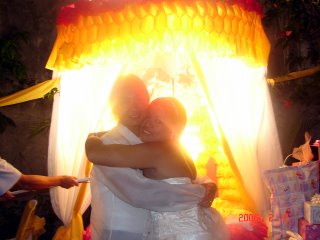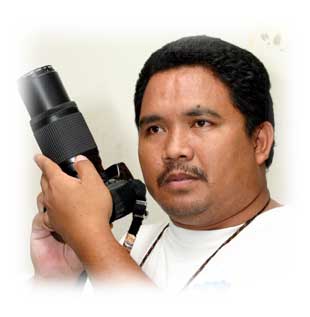Got this from the Center for Media Freedom and Responsibility's
blog (Pres. Arroyo's picture with Vice-Pres. De Castro and AFP Chief Generoso Senga was from a
Malacañang site):
MANILA, Philippines – Exactly twenty years after the restoration of democracy and press freedom in the country, local media was again under threat shortly after President Gloria Macapagal-Arroyo declared a state of national emergency via Presidential Proclamation 1017 (PP1017) early in the morning of 24 February.

Several hours after the declaration of PP1017, elements of the Philippine National Police (PNP) swooped down the offices of oppositionist national newspaper
The Daily Tribune along T.M. Kalaw Street here around 12:30 am Saturday (25 February).
The policemen, who came from the Criminal Investigation and Detection Group (CIDG) and numbering about 15, took mock-up copies of the newspaper’s Saturday edition—which bannered Arroyo’s declaration—as well as several story drafts and photos.
Inspector Jonathan Pablito of the Police Community Relations Group based at the PNP’s headquarters in Camp Crame, Quezon City later confirmed that they were tasked to secure the
Tribune offices “because it was a possible source of destabilization materials.” Pablito clarified however, that they were ordered not to impede the work of the publication’s editorial staff and reporters.
Several staffers of
Tribune said they were able to go to work as usual during the past weekend, although they admitted being distracted by the presence of the police.
Policemen from the national headquarters remained stationed inside the editorial and business offices of the
Tribune, while operatives from the Manila Police District have been posted outside the building. Several law enforcers were also seen surrounding the premises of another pro-opposition newspaper,
Malaya, and its sister publication, the tabloid
Abante, reports said.
Presidential Chief of Staff Mike Defensor stressed that the government has not taken over the
Tribune, but added that the “strong presence” of the police in the editorial offices of the newspaper will remain, to caution other media organizations not to aid those who want to overthrow the government.
In meetings with police officials, Defensor said it was agreed that the government would not interfere with the stories that the paper would put out.
The
Tribune has been consistently publishing reports critical of the Arroyo administration. Leading to its temporary seizure by the police early Saturday, the said publication released stories that several disgruntled military and leftist were forming up to mount a coup against Arroyo.
Arroyo declared PP1017 primarily to quell a rebellion allegedly instigated by renegade military officers, supported by civilian supporters and leftist groups wanting to topple the government. Arroyo is facing serious charges of election fraud, allegedly incurred in 2004.
Under this emergency state, the government has the power to take over media facilities whose operations are deemed a risk to national security, Defensor claimed. PP1017 specifically invokes
Section 17, Article 12 of the country’s Constitution, which gives the president the power to "temporarily take over or direct the operation of any privately owned public utility or business affected with public interest" in times of national emergency.
In the wake of the raid on the
Tribune, Defensor professed the government is currently talking to owners and editors of other media organizations to clarify issues.
In the meantime, military personnel have been stationed outside broadcast network giants, GMA Channel 7 and ABS-CBN Channel 2. According to the government, the military personnel is there “to protect” these media establishments in the event that lawless elements try to take control of them.
Defensor said police presence in media organizations is not a regular state policy. The proclamation, which put the country under a state of emergency, said that some elements of the media are “recklessly” promoting the cause of those who want to overthrow the administration.
Last Friday (24 February),
Philippine Daily Inquirer columnist Randy David, lawyer and
BusinessWorld columnist Argee Guevarra as well as 35 other militant leaders and academicians, were held by the police for allegedly inciting sedition and leading several hundred of protesters in Epifanio de los Santos Avenue, one of the main thoroughfares in Metro Manila. Guevarra was also the legal counsel of Marine colonel Ariel Querubin, one of the two top military officials charged with planning to lead a botched coup attempt.
On 25 February afternoon, 15 hours after the raid on the
Tribune, PNP Director General Arturo Lomibao has warned that the police will take over news groups that will not conform to “standards set by the government.”
This is in accordance with Presidential General Order No. 5 (GO5), directing the country’s armed forces—the military (Armed Forces of the Philippines or AFP) and PNP—to maintain “peace and order and prevent and suppress lawless violence.”
As implied by GO5, reports or publications that hurt the government by “obstructing governance including hindering the growth of the economy and sabotaging the people’s confidence in government” will be subjected to review and possible prohibition, according to Lomibao. GO5 was made in pursuant to PP1017, calling upon the military and police to take direct control of the peace and order in the country.
Lomibao said police will implement standards for media, as a small group of investigators and prosecutors will monitor the news.
Local media sounds the alarm
Tribune publisher and editor in chief Niñez Cacho-Olivarez said she was tipped off a day earlier that she was on a list of people to be arrested by the government.
"It’s just like (late former dictator Ferdinand) Marcos all over again. It won't be long before they start ringing editors and asking them to fire columnists or writers they consider being against them," Olivarez added, as quoted by the Inquirer online news service.
The raid on
Tribune appears to signal the “start of a crackdown on media organizations," according to
Newsbreak magazine editor in chief Marites Danguilan-Vitug in a statement to a local online news website.
Vergel Santos, chairman of the board of advisers of the
Center for Media Freedom and Responsibility (CMFR) likened Arroyo’s proclamation and the corresponding harassment to media to the tactics used by Marcos during the Martial Law period (1972-81). Marcos was toppled by a peaceful revolt on 25 February 1986, in what has been popularly known as the “Edsa People Power Revolution.”
Santos said media organizations must unite and oppose PP1017 and any effort to suppress press freedom.
In its released statement, CMFR noted that President Corazon Aquino withstood seven coup attempts during her term without having to close down a single newspaper. The press was then left to cover the crises without government guidelines.
“The current attacks against the press are obviously needless, unless these fulfill a larger design to hold absolute unquestioned power,” CMFR added.
In declaring a “state of national emergency,” Arroyo made media among her main targets, the
National Union of Journalists in the Philippines (NUJP) said in its official statement.
“That Mrs. Arroyo timed this crackdown on civil liberties with the anniversary of the Marcos dictatorship’s fall only highlights her break with the democratic aspirations of Filipinos,” NUJP added in its statement. “Even as she warns enemies of feeling the full force of the law, Mrs. Arroyo flaunts constitutional guarantees to free speech and expression and press freedom.”
“The role of media is that of serving as a watchdog for exposing social injustice and abuse of power,” Vice president Noli de Castro said in concurrence with reaction of the media groups. “The government may do justice to media by encouraging self-regulation and not repression.”
A former journalist himself, de Castro pointed however, that “if law enforcers believe that a media entity is committing crime against any person or government, then they must immediately enforce the law.”
Earlier, on Friday (24 February) afternoon, the
Kapisanan ng mga Brodkaster ng Pilipinas (KBP), a national federation of broadcast media entities, held a dialogue with the government’s
National Telecommunications Commission (NTC) to discuss the ramifications of PP1017.
NTC assured the KBP members that it respects the freedom of the press and of free speech and expression as protected by the Constitution. The government’s telecommunications agency also pledged to observe due process in addressing matters affecting the broadcast industry, especially under the present situation.
The national publisher’s union meanwhile, took a more resolute stand in the face of Arroyo’s proclamation.
“Our commitment is to the truth. And while we have the room, however being constricted, nothing will bar us from pursuing our duty,” the
Philippine Press Institute said in a public statement.
With reports from the Inquirer
News Services













